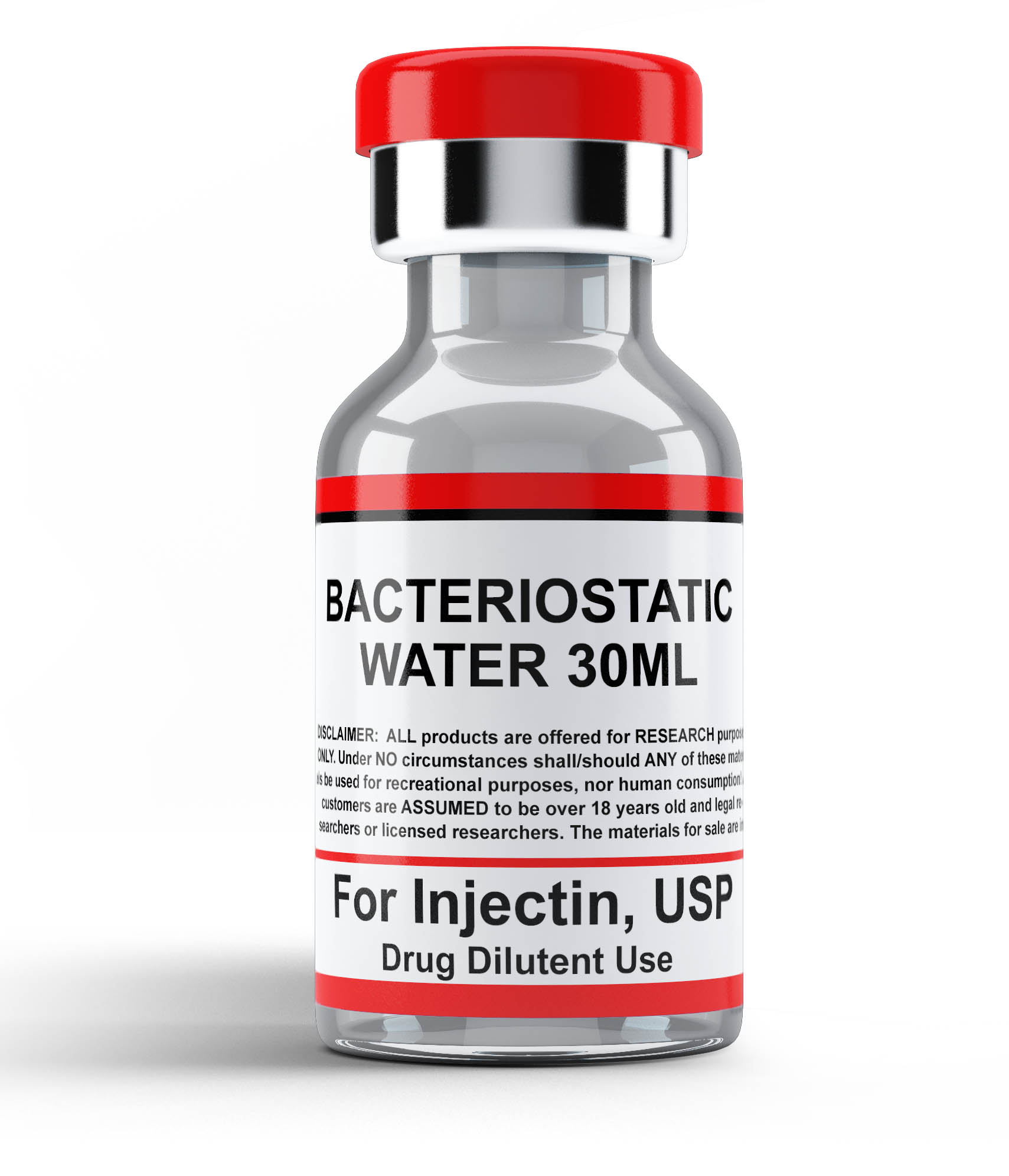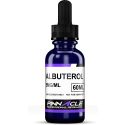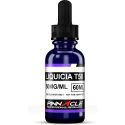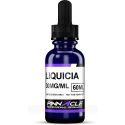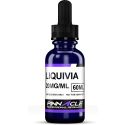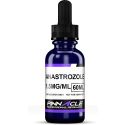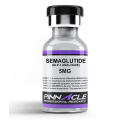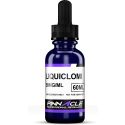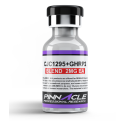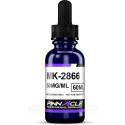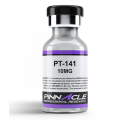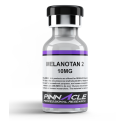What Is IGF-1 DES 1MG?
IGF-1 Des is a man-made analog of insulin-like growth factor-1 (IGF-1), a naturally occurring hormone found in the human brain and pig uterine tissues. IGF-1 Des lacks the first three amino acids at the N-terminus of IGF-1, which makes it more potent and bioavailable compared to IGF-1. It has been shown to build muscle mass, boost bone health and improve autism. At Pinnacle Peptides, IGF-1 Des for sale is only available for research, not for human consumption.
Structure Of IGF-1 DES 1MG
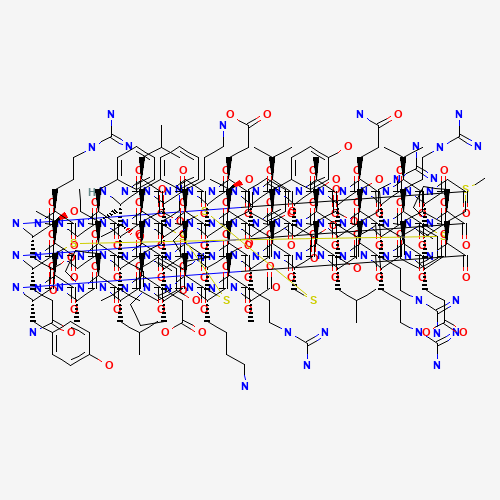
From Pubchem
Synonyms: Insulin-like growth factor 1, des-(1-3)-, Des(1-3)igf-I
Molecular Formula: C319H495N91O96S7
Molecular Weight: 7365.4225 g/mol
CAS number: 112603-35-7
PubChem CID: 135331146
Mechanism Of IGF-1 DES 1MG
IGF-1 binds to the specific receptor IGF-1R present on the surface of many cell types. It initiates intracellular signaling, particularly AKT signaling pathway that stimulates cell growth and proliferation and inhibits apoptosis. It also has metabolic effects similar to insulin, promoting the uptake of glucose from the blood. Furthermore, it is involved in tissue repair and anabolic (tissue building) process.
Pre-Clinical/Clinical Research
1. Cognitive Function
As we age, IGF-1 concentration in plasma declines and so does the cognitive function. Studies suggest that IGF-1 improves cognitive function and neuroprotection. It promotes cellular survival and prevents the death of neuronal cells [1]. One study on aged animals found that IGF-1 administration for the long term promotes glucose utilization in brain areas responsible for learning and memory [2].
Furthermore, research on rats shows that IGF-1 increases excitatory synaptic transmission in CA1 by 40%. It also revealed that increased postsynaptic transmission might be due to the activation of α-amino-3-hydroxyl-5-methyl-4-isoxazolepropionate (AMPA) receptors. Researchers also suggested that this effect might also be dependent on PI3k receptors, as synaptic transmission was blocked in the presence of PI3k inhibitors [3].
2. Muscle Health
Studies have shown that both insulin-like growth factor 1 (IGF-1) and IGF-1 Des play a role in promoting muscle growth and hypertrophy. Overexpression of IGF-1 in muscles leads to an increase in muscle size. In a cross-sectional study involving women, it was observed that participants with low levels of IGF-1 experienced reduced knee extensor muscle strength, slower walking speed, and challenges with mobility tasks [4].
The potential mechanism by which IGF-1 promotes muscle development is through the activation of the PI3K/Akt signaling pathway. One study found that IGF-1 stimulates the proliferation of myofibroblasts in a dose-dependent manner. Furthermore, IGF-1 increases the expression of genes associated with cell cycle regulation. Notably, this effect was reduced by the inhibitors of PI3k/Akt, indicating the significance of the PI3/Akt pathway in the cell growth stimulated by IGF-1 [5].
Moreover, another study highlights that muscle-specific expression of IGF-1 can alleviate muscle wasting induced by angiotensin II [6].
3. Autism
Research shows that IGF-1 deficiency is associated with poor social behavior in children. In one study, researchers found that children suffering from autism had lower levels of IGF-1 as compared to healthy kids [7]. Literature shows that IGF-1 improves the neurobiological features of autism, including brain network disconnectivity. Furthermore, it has been shown to alleviate symptoms of Rett syndrome, a condition with characteristics like autism [8].
One randomized double-blind placebo-controlled study was conducted on 9 children with Phelan-McDermid syndrome (PMS), a type of autism disorder. Participants either received IGF-1 or placebo for three months in a random order. The researchers observed that the treatment group experienced an improvement in restrictive behaviors and social impairment [9].
4. Potency
IGF-1 Des differs from IGF-1 by the lack of three amino acids at the N-terminus. This modification causes the reduced binding affinity to insulin-like growth factor binding proteins (IGFBPs). This, in turn, makes the drug more bioavailable and potent. Furthermore, reduced affinity to binding proteins causes rapid clearance and withdrawal of the drug from the body [10].
One study conducted on marmosets and pigs found IGF-1 des to be 2-3 times more potent than IGF-1 [11]. Another study revealed that the administration of des (1-3) IGF-I in 55 kg pigs resulted in a more pronounced reduction in blood glucose levels when compared to the effects of IGF-1 [12].
4. Bone Health
IGF-1 plays an important role in bone health. One study found that a low concentration of IGF-1 in plasma is associated with vertebral fractures in diabetes patients [13]. On the other hand, IGF-1 administration has been shown to increase bone resorption and bone formation. Furthermore, it promotes bone healing in patients with hip and tibia fractures [14].
Summary
IGF-1 Des is a potent natural analog of insulin-like growth factor-1. It promotes cell differentiation and proliferation and has been shown to build muscle mass and strength. Further, it positively impacts bone health and prevents age-related cognitive decline. We don’t support its unwarranted use and offer IGF-1 Des purchase only for research purposes. Buy IGF-1 Des from Pinnacle Peptides to elevate your research.
References
- Górecki, D.C., M. Beresewicz, and B. Zabłocka, Neuroprotective effects of short peptides derived from the Insulin-like growth factor 1. Neurochem Int, 2007. 51(8): p. 451-8.
- Sonntag, W.E., M. Ramsey, and C.S. Carter, Growth hormone and insulin-like growth factor-1 (IGF-1) and their influence on cognitive aging. Ageing Research Reviews, 2005. 4(2): p. 195-212.
- Ramsey, M.M., et al., Functional Characterization of Des-IGF-1 Action at Excitatory Synapses in the CA1 Region of Rat Hippocampus. Journal of Neurophysiology, 2005. 94(1): p. 247-254.
- Cappola, A.R., et al., Association of IGF-I levels with muscle strength and mobility in older women. J Clin Endocrinol Metab, 2001. 86(9): p. 4139-46.
- Yu, M., et al., Insulin-like growth factor-1 (IGF-1) promotes myoblast proliferation and skeletal muscle growth of embryonic chickens via the PI3K/Akt signalling pathway. Cell Biology International, 2015. 39(8): p. 910-922.
- Song, Y.-H., et al., Muscle-specific expression of IGF-1 blocks angiotensin II–induced skeletal muscle wasting. The Journal of Clinical Investigation, 2005. 115(2): p. 451-458..
- Steinman, G., IGF – Autism prevention/amelioration. Medical Hypotheses, 2019. 122: p. 45-47.
- Bou Khalil, R., Is insulin growth factor-1 the future for treating autism spectrum disorder and/or schizophrenia? Medical Hypotheses, 2017. 99: p. 23-25.
- Kolevzon, A., et al., A pilot controlled trial of insulin-like growth factor-1 in children with Phelan-McDermid syndrome. Molecular Autism, 2014. 5(1): p. 54.
- Ballard, F.J., et al., Effects of interactions between IGFBPs and IGFs on the plasma clearance and in vivo biological activities of IGFs and IGF analogs. Growth Regul, 1993. 3(1): p. 40-4.
- Tomas, F.M., P.E. Walton, F.R. Dunshea, and F.J. Ballard, IGF-I variants which bind poorly to IGF-binding proteins show more potent and prolonged hypoglycaemic action than native IGF-I in pigs and marmoset monkeys. J Endocrinol, 1997. 155(2): p. 377-86.
- Walton, P.E., F.R. Dunshea, and F.J. Ballard, In vivo actions of IGF analogues with poor affinities for IGFBPs: metabolic and growth effects in pigs of different ages and GH responsiveness. Prog Growth Factor Res, 1995. 6(2-4): p. 385-95.
- Ardawi, M.-S.M., et al., Increased serum sclerostin and decreased serum IGF-1 are associated with vertebral fractures among postmenopausal women with type-2 diabetes. Bone, 2013. 56(2): p. 355-362.
- Locatelli, V. and V.E. Bianchi, Effect of GH/IGF-1 on Bone Metabolism and Osteoporsosis. Int J Endocrinol, 2014. 2014: p. 235060.
A precisely trimmed form of IGF-1 - IGF-1 DES comprises of a tri-peptide structure containing the molecules of Glycine-Proline-Glutamine. Used in the in vivo studies, IGF-1 DES 1mg has been used in brains of humans, bovine colostrums, and uterus of pigs. When combined with the in vitro studies, the usage of IGF-1 DES suggested that this peptide was more potent that the original IGF-1. IGF-1 DES was found to be active in triggering the hypertrophy and proliferation in cultured cells. This effect is induced into the cells by IGF-1 DES by alteration of the molecular sequence the originally circulating IGF-1 through the action of protease enzyme. Researchers can buy IGF-1 DES 1mg online in its purest form through Pinnacle Peptides at attractive prices Originally extracted from E. coli - Insulin like Growth Factor (IGF)-1 DES comprises of 67 amino acids that are linked through a polypeptide chain. The extraction of this peptide from the original IGF-1 protein gave it a more stable and functional form. The proteinaceous fragment of this growth factor is a trait of the IGF-1 family of peptides. This group of peptides play a vital role in the growth and development of various organs and tissues in mammals. While it is IGF1 that is responsible for the mediation of most of the growth-promoting effects of the body, IGF-1 DES is the one that is capable of rendering the same level of response with its shorter molecular structure. Studies performed through the decades got initiated with the use of growth hormone that could not trigger the incorporation of sulphate into cartilage directly. As a result, the growth hormone would exert its effects through the serum factor, which is also known as the 'sulphating factor'. This factor was later termed as 'somatomedin' or IGF-1. IGF-1 has been recently truncated to give rise to IGF-1 DES for expanding the therapeutic application of growth hormone. IGF-1 DES 1mg for sale here is the standard dose used by researchers for conducting experiments on animals as well as human subjects. When ordered in bulk, you can buy IGF-1 DES for a discounted price through the online retailer Pinnacle Peptides. The products we offer are intended for laboratory research use only. In purchasing any of these items, the customer acknowledges that there are risks involved with consumption or distribution of these products. These chemicals are NOT intended to use as food additives, drugs, cosmetics, household chemicals or other inappropriate applications. The listing of a material on this site does not constitute a license to its use in infringement of any patent. All of the products will be handled only by qualified and properly trained professionals. All customers represent and warrant that through their own review and study that they are fully aware and knowledgeable about the following: Government regulations regarding the use of and exposure to all products. The health and safety hazards associated with the handling of the products they purchase. The necessity of adequately warning of the health and safety hazards associated with any products. Pinnacle Peptides and pinnaclepeptides.com reserves the right to limit and/or deny sales of products to any unqualified individuals if we have reason to believe that misuse will occur.


